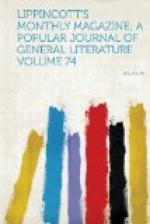Mr. Heathcote at least was not sorry to find that they were, as he said. “booked for Baltimore.” The image of the beautiful Miss Bascombe had not been effaced. Perhaps he had photographed it by some private process on his heart with the lover’s camera, which takes rather idealized but very charming pictures, some of which never fade. At all events, there it was, very distinct and very lovely, and always hung on the line in his mental picture-gallery. It was positively with trepidation that he presented himself before her very soon after his arrival; and an undeniable blush “mantled” his cheek—if a blush can be said with any propriety to mantle the male cheek—– when he marched into the drawing-room, where she was doing a dainty bit of embroidery, and with much simplicity and directness said, “You said I might come, you know, and I have come; and I begged of Ethel to come too, but she could not leave my aunt,” before he had so much as shaken hands. Of course no well-regulated and well-bred young woman—and Miss Bascombe was both—ever permits herself to remember any man until she is engaged to him; but she need not forget one that has impressed her agreeably. Miss Bascombe had not forgotten the handsome Englishman she had met at Jenny De Witt’s, nor the little lecture she had given him on the duties of brothers to sisters, and it did not strike her that his inaugural address was at all eccentric or mysterious. He had been told what he ought to do; he had tried to do it, as was quite right and proper. He deserved some reward. And he got it,—though only as an encouragement to abstract virtue, of course. The young lady was pleased to be friendly, gracious, charming. Her mother came in presently, was equally friendly and gracious, and almost as charming. Her father came home to dinner, and was friendly too, and hearty, and very hospitable. Her brothers were friendliest of all. He knew quite well that he had no claim on them, that he had not saved the life of any member of the family or laid them under any sort of obligation, individually or collectively, and no reception could have seemed more special and dangerously cordial, yet no anxieties oppressed, no fears distracted him. The weight of excessive eligibility suddenly slipped off him, like the albatross from the neck of the Ancient Mariner, leaving him a thankful and a happy man, and in a week he had established himself firmly at the Bascombes’, declined to accompany his uncle to Virginia, and definitely settled




